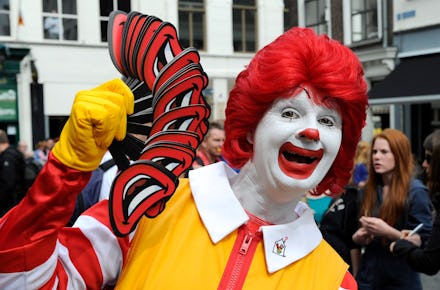This Study Proves Just How Bad Fast Food Workers Have It

McDonald's recorded a profit of $5.5 billion last year, and at least $1.2 billion of that came straight from Uncle Sam. That's the amount taxpayers paid McDonald's workers through public assistance programs, according to a new report out this week from the Nation Employment Law Project.
The report, and a recently-released study from U.C. Berkeley's Center for Labor Research and Education, paint a grim picture of enormously profitable corporations foisting labor costs onto the public. Median pay for front-line fast food workers is $8.69 an hour, just $1.44 above the federal minimum wage, and 87% percent do not receive employer health benefits. This compensation is not enough to live on, and the end result is that 52% percent of these workers' families receive public assistance. This can and should be stopped by the imposition of a higher minimum wage.
The public support fast food workers receive is for bare essentials. $3.9 billion from Medicaid and the Children's Health Insurance Program (CHIP) cover basic health needs. $1.04 billion in food stamps puts dinner on the table. $1.91 billion in Earned Income Tax Credit gives employees' children a fighting chance. Fast food restaurant workers could not survive without these subsidies, which total at least $7 billion per year. When an industry refuses to pay its employees even a rudimentary living wage, taxpayers are forced to fill the gap. Fast food doesn't want to pay its labor bill, so everyone else has to.
Raising the minimum wage would solve this problem by recognizing that human labor has a baseline intrinsic cost: a living wage. Unless we as a society are willing to watch our fellow citizens live and die on the streets, this minimum must be met. Dr. Amy K. Glasmeier at MIT has thoroughly studied this value, and determined that in no U.S. state does the minimum wage exceed the cost of even impoverished subsistence. With the fast food industry's $8.69 median wage just $1.44 above the $7.25 federal minimum, many employees are forced into part-time positions, front-line fast-food work quickly becomes unlivable, and government intervention is necessary to keep employees in even the bleakest poverty.
All this emergency assistance takes place against the backdrop of growing industry revenue and profits that have fully recovered from the turmoils of the Great Recession. While fast-food executives are fond of pointing out that theirs is a low-margin business (projected about 3.6% percent in 2013) it is inexcusable for a company to make any profits while the majority of its employees are being paid in part by the government. Raising the minimum wage would help address this problem by forcing fast food corporations to accept the full costs of the people they employ.
The Huffington Post recently raised a hubbub by publishing and then retracting an article about an undergraduate research project that allegedly to proved the price of a Big Mac would increase by only $0.68 if the minimum wage was raised to $15 (as some have campaigned for). This is wildly false. A minimum wage increase of that magnitude would undoubtedly raise the sticker price of a Big Mac substantially. A proposal like the Fair Minimum Wage Act, which would raise it to $10.10, makes much more sense. The sticker price of a Big Mac would rise, but it turns out that the sticker price isn't all you're paying.